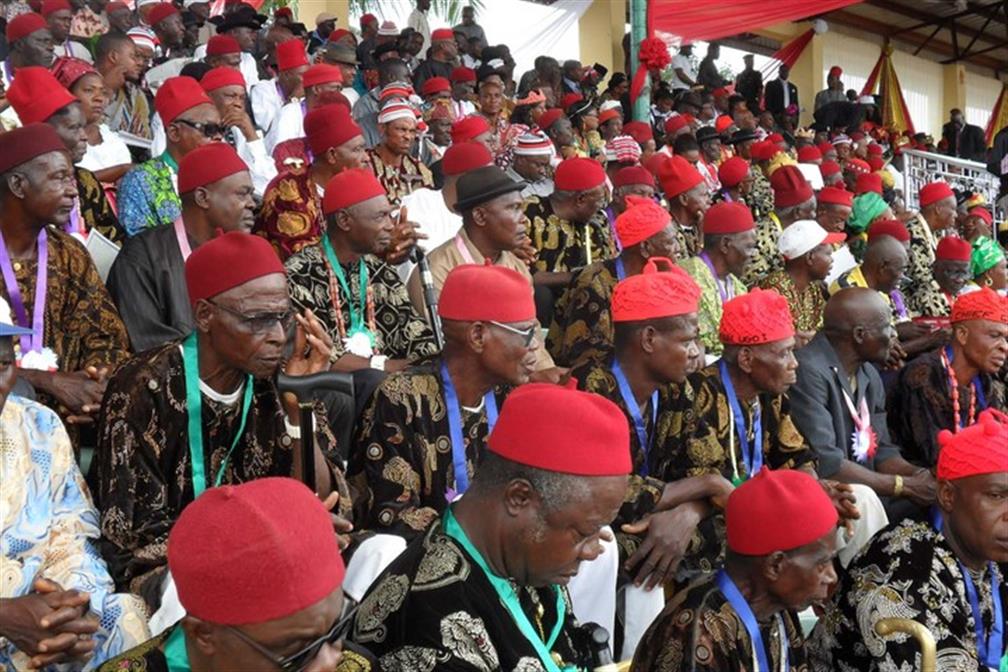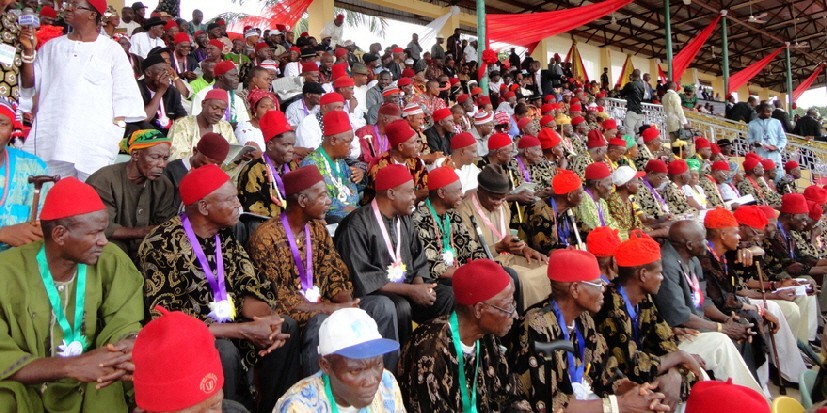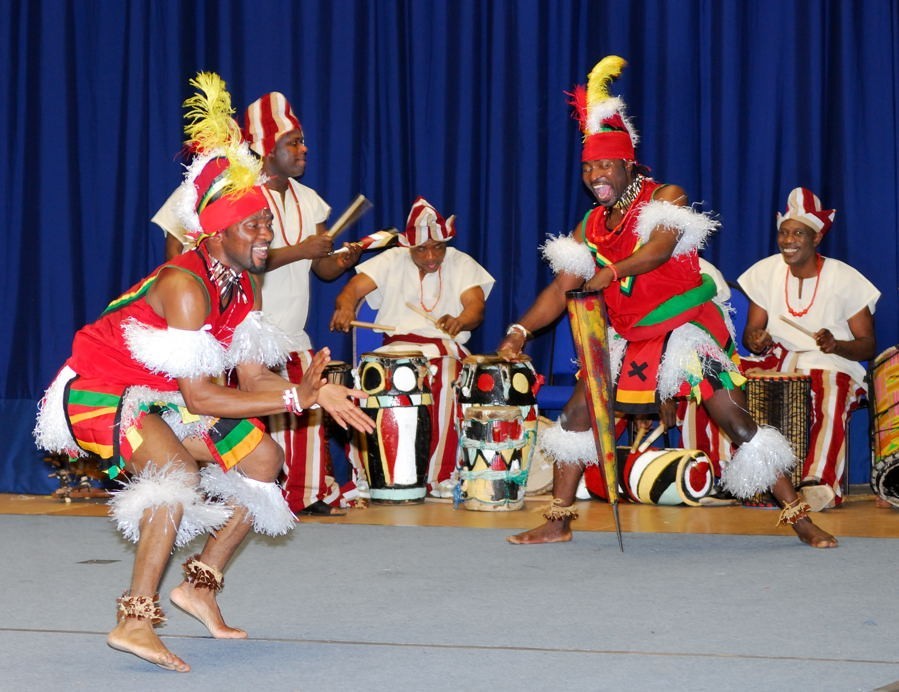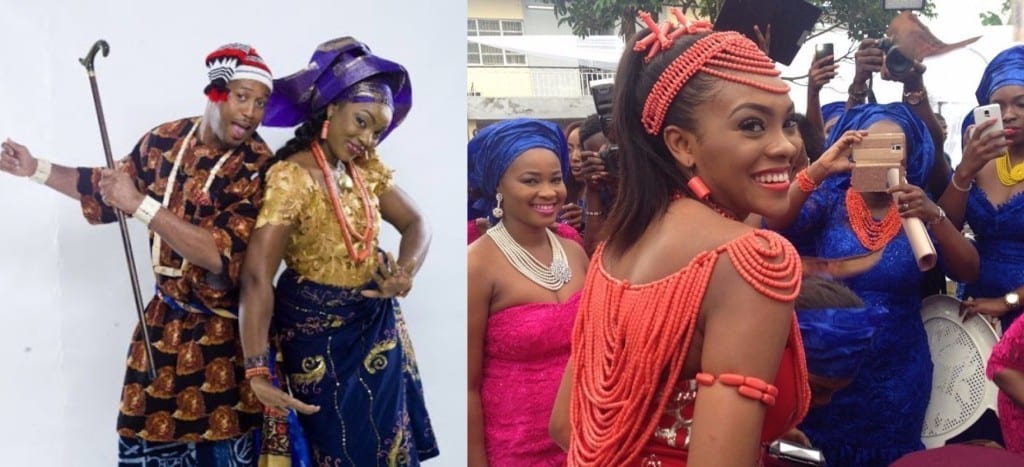There are more than 300 Nigerian tribes and among which are three which are often referred to as the major ones, and these three are the Hausa people, the Igbo people, and the Yorubas. Igbo is a language spoken by Igbo people of the Igbo ethnic group, one of the three major ethnic groups in Nigeria. The group is indigenous to the Southeastern part of the country, mostly on the eastern side of the Niger River, a region considered to be one of the most densely populated regions in the whole of Africa.
Who Are The Igbo People?
The Igbo people, natively called Ndi Igbo and also spelled as Ibo or Eboe, are the third-largest ethnic group in Nigeria. The tribe comes after the second-placed Yoruba ethnic group from the western part of Nigeria and the leading Fulani-Hausa ethnic group from the northern part of the country.
The exact population of the Igbo people is not fully known. The CIA World Factbook, however, estimates that there are about 32 million. This forms less than 20% of the total Nigerian population. The Hausa-Fulani account for about 29%, while the Yoruba forms around 21% of the entire population.
Igbo people are native to five main states in Nigeria. They are Abia, Anambra, Ebonyi, Enugu (it’s unofficial capital), and Imo State. The Igbo’s, however, claim that their territory extends to present day Delta State to the west and Cross-River, Akwa-Ibom and Rivers State to the south. This is backed up by the presence of native Igbo speakers in these states. Prominent cities and towns where the Igbos reside include Owerri, Aba, Abakaliki, Onitsha, Afikpo, Asaba, Orlu, Agbor, Umuahia, Okigwe, Nsukka, and Port Harcourt. The Igbo people will also be found in cities outside Igboland such as Lagos, and Abuja. For many centuries, the Igbo people have always lived in peace with their neighbouring communities that consist of the Ibibio, Nupe, Ijo, Idoma, Igala, and Ekoi people.
Igbo people are said to be the most dispersed ethnic community in Nigeria. This migration started in the early days of the slave trade and continues to be felt to this day. Well known and famous African-American figures have laid claim as being Igbo. This has been based on DNA profiling. Notable people include the world-renowned Bishop T.D. Jakes, as well as famous actors who include Paul Robeson, Forest Whittaker, and also Blair Underwood.
Igbo people are mostly traders, farmers, and craftsmen, with Agriculture being the most dominant activity. The main crops farmed in the region constitutes yam, taro, cassava, and fruit of the palm tree. The yam is the main staple food which is also exported to neighbouring regions. There is also an annual celebration that is held to mark the harvesting of yams. Over time, people have been turning to cultivating the fruit of the palm due to its palm oil. The palm crop is the leading cash crop in the region owing to the large quantities of palm oil that are exported outside Nigeria.
Politics and Leadership
Although politics play an integral part in the people of Ibo community, their political impact is never really felt in Nigerian politics. This is attributed to the numerous divisions and fragments that exist in the region. This effect was first felt during the Nigerian civil war also known as the Nigerian/Biafra war. This war that took place between 1966 and 1970 pitted the Igbo, Efik, Ibibio, and other communities living in the region, against the Northern Muslims. Since then, the political system in Igboland has never really recovered. Political representations are in a very low-key, and also few people of Igbo origin hold any major political offices.
Igbo Language
The main language spoken by the Igbo people is the Igbo language, natively called Asusu Igbo. The language has approximately 24 million speakers, who are primarily of Igbo descent and live mostly in Nigeria but can also be found in other countries such as Equatorial Guinea where it is recognized as a minority language.
There have been discussions in recent time in regards to the possible extinction of the Igbo language in about 50 years. This is thanks to the preference for the use of English, which is perceived as the language of status and opportunity by native Igbo speakers. That has, in turn, led to a declining population of monolingual Igbo speakers, the deterioration of idioms, proverbs, and other rhetorical elements of the Igbo language.

Religion
The main religion in Igboland is Christianity, with more than half of the population identifying as the Roman Catholics. A huge percentage, in recent times, has also begun to identify with Protestant/Evangelical.
Other religions practised in the region include the traditional religion referred to as Odinani, Islam, and Judaism. The Igbo people are very religious. They always observe the religious rites as well as traditional rituals of passage in different stages of their lives. This will happen during childbirth, marriage, initiation, as well as burials. However, western-based religions are gradually taking over as the preferred religions instead of the traditional practices.
Igbo Culture
Igbo culture includes the various customs, practices, and traditions that comprise archaic practices as well as new concepts. These customs and traditions include the Igbo people’s visual art, use of language, music, and dance forms, as well as their attire, cuisine, and language dialects. Because of their various subgroups, the variety of their culture is heightened further.
Though many characteristics of the Igbo culture are a bit unconventional, when it comes to socializing they tend to be very traditional. Respect is given to the male head of the household, and also to the elderly. It is ingrained in children from an early age to respect their elders at all times, and under all circumstances.
As in many cultures, your social status depends on your status of wealth. The Igbo people classify members of their community into three groups. The “nnukwu mmadu” are the rich, the “dimkpa” are the middle class, and the “ogbenye” are the lower class. It is vastly similar to most other classification systems around the world.
Igbos Celebrate Birth and Death Graciously
The Igbos hold birth and death at a very high and celebrated standard. When a child is born into the Igbo culture, the members of that particular community throw a naming ceremony in which friends and family choose various names for the child. Once the child is born, the umbilical cord of the child is buried under a tree of the mother’s choosing. From that point forward, they believe that the tree belongs to the child, and it will grow in accordance with how successful the child becomes.
Death is also of high importance for the Igbo people. When a family member passes, there is a service held in which the body is sat in an upright position, and friends and family alike can come and pay their respects. Males who were the head of the household are often buried underneath the ground of their family’s house. The Igbo people view death as a time for commemoration as opposed to a time of sadness.
Music is Greatly Appreciated in Igbo Land
The Igbo people are known for their appreciation of music and various handmade instruments. Most of their instruments are either in the string or woodwind categories. They often play the “opi” (similar to the flute) or the “ubaw-akwala” which resembles a triangular guitar. Musicians will often circle the land at night playing the ubaw-akwala for residents and passersby.
The Igbos also have different styles of music that they perform. Their main musical genre is one called “Ikorodo”, which is performed with various instruments and lead vocals. They also enjoy “Highlife”, which is a genre of music popular in the rest of West Africa as well. Highlife is a unique combination of jazz and classical music.
Igbo Fashion is Colorful
In Igbo fashion, the Midwestern fashion can vary from the eastern culture, but they generally surround the same concept. Men are known to wear robes with simple shirts over them with sandals, or they may wear dashikis, which are shirts extra long in length that are decorated with various jewels and patterns. Dashikis are often worn during formal events and celebrations.
Igbo Traditional Food
The Igbo people have one of the most nutritious and delicious delicacies that sort for all over the world. Their cuisine includes the dishes like ukwa (breadfruit), Ofe Onugbo (bitter leaf soup), Ofe Oha/Ora (Oha soup), Ofe Okazi (Okazi soup), Abacha. Ugba (Oil bean) and many more.
A notable cultural practice by the Igbo people is the New Yam Festival which is held annually at the end of the rainy season in early August. Yam is an important crop for the Igbo people and it is also the first to be harvested. The festival is held to welcome the new yams, while the old ones are all eaten up or discarded the night before.
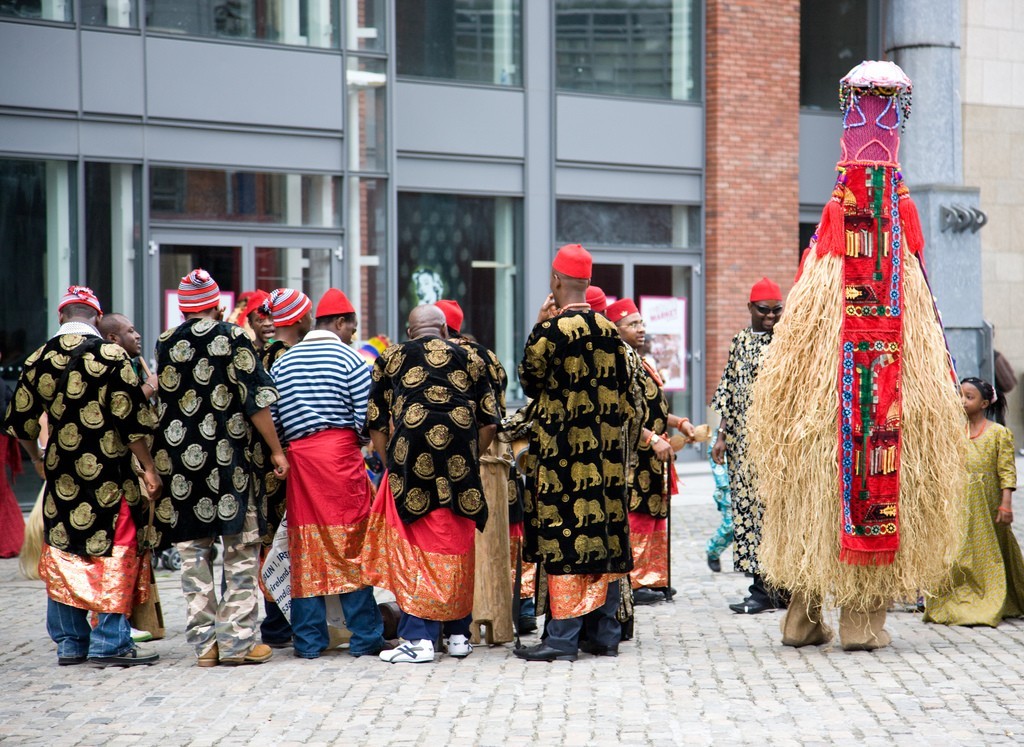
Masquerade
Another notable part of the Igbo culture is the masquerade, natively called Mmanwu. It is a major form of entertainment in the region used to celebrate mainly the harvest seasons but could also be used during other times. Other functions could include protection, enforcing village curfews, and serving as village security guards.
Members of a masquerade are usually not known. They wear masks to hide their identity from the rest of the village. The mask is made to resemble the spirit of a dead community member and it is thought that by wearing the mask, a masquerade will have spiritual powers that are conducted through the mask.
FAQs
What Are the Igbos Known For?
The Igbos of south-eastern Nigeria are known for their enterprising, independent and adventurous nature
Where are the Igbo People Found?
The Igbo People, also known as Ibos are largely found in the South Eastern Nigeria
What language do the Igbo People Speak?
Igbo people speak Igbo, a language of the Benue-Congo branch of the Niger-Congo language family.
What Religion is Predominant in Igbo Land?
Christianity is more dominant in Igbo land
What’s the Difference Between Igbo and Yoruba?
The Igbo people are from South East Nigeria and they speak the Igbo language. The Yoruba people, on the other hand, are in South West Nigeria and they speak the Yoruba language
